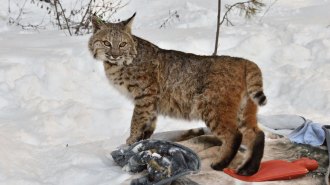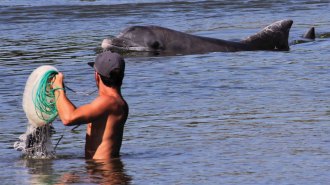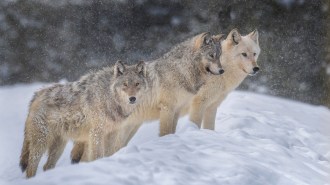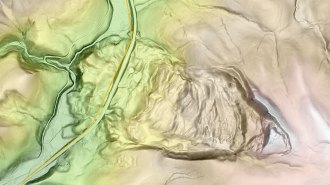Search Results for: Wolves
Skip to resultsCan’t find what you’re looking for? Visit our FAQ page.
408 results for: Wolves
-
 Life
LifeLarge predators push coyotes and bobcats near people and to their demise
Coyotes and bobcats hide near people when wolves, cougars and other large predators are close-by, putting the smaller carnivores at a higher risk of dying at human hands.
By Freda Kreier -
 Animals
AnimalsHere are 3 people-animal collaborations besides dolphins and Brazilians
Dolphins working with people to catch fish recently made a big splash. But humans and other animals have cooperated throughout history.
-
 Life
LifeA parasite makes wolves more likely to become pack leaders
In Yellowstone National Park, gray wolves infected with Toxoplasma gondii make riskier decisions, making them more likely to split off from the pack.
By Jake Buehler -
 Animals
AnimalsChicken DNA is replacing the genetics of their ancestral jungle fowl
Up to half of modern jungle fowl genes have been inherited from domesticated chickens. That could threaten the wild birds’ long-term survival.
By Jake Buehler -
 Animals
AnimalsThese are our favorite animal stories of 2022
Goldfish driving cars, skydiving salamanders and spiders dodging postcoital death are among the critters that most impressed the Science News staff.
-
 Animals
AnimalsVideo shows the first red fox known to fish for food
Big fish in shallow water are easy pickings for one fox — the first of its kind known to fish, a study finds.
By Freda Kreier -
 Earth
EarthLandslides shaped a hidden landscape within Yellowstone
Scientists have used lasers to get a detailed view of the national park’s topography, and they’ve spotted more than a thousand landslides.
-
 Anthropology
AnthropologyHow mythology could help demystify dog domestication
The path that dog myths took around the world closely parallels that of dog domestication, a new study finds.
-
 Animals
AnimalsThis spider literally flips for its food
The Australian ant-slayer spider’s acrobatics let it feast on insects twice its size, a new study shows,
By Freda Kreier -
 Animals
AnimalsAn Arctic hare traveled at least 388 kilometers in a record-breaking journey
An Arctic hare’s dash across northern Canada, the longest seen among hares and their relatives, is changing how scientists think about tundra ecology.
-

-
